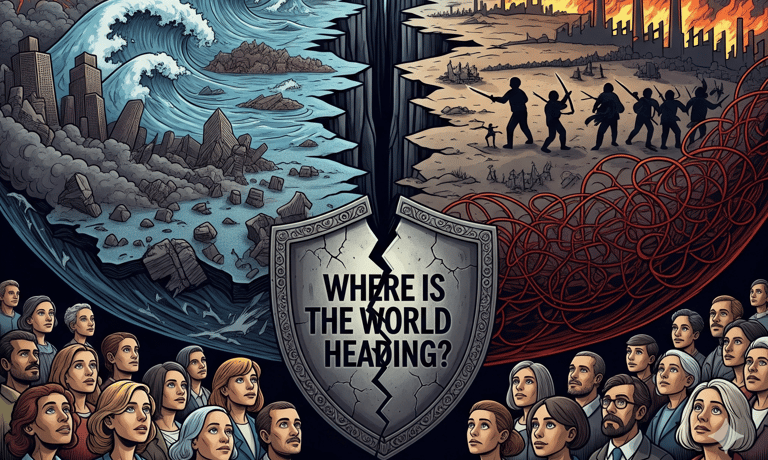From Ukraine to Middle East: The Making of a New World Order
How Wars are reshaping alliances and rewriting global rules


From Ukraine to the Middle East, today’s conflicts are not just wars — they’re rewriting the global order in ways we have never seen before. These are not isolated crises; they are seismic shocks accelerating a fundamental geopolitical shift. The era of US-led dominance has faded, giving way to a fractured landscape where influence is diluted, rivalries are sharper, and multipolar competition defines the rules of the game.
The rules that governed global politics for decades are eroding, replaced by new ones being rewritten in real time — too often shaped by the whims and fancies of powerful states rather than by collective principles. The world we are stepping into is unpredictable, and the rules of governing it or navigating through for mere survival of humankind are still being rewritten every new day.
Shifting Alliances, Hardening Blocs
The war in Ukraine has been a brutal turning point. It has re-energized NATO and strengthened transatlantic unity, and has also pushed Russia into deeper partnership with China, Iran, and North Korea — an emerging anti-Western axis, defined less by shared values than by shared opposition.
On the other front, the Global South has carved out an independent role for itself. From Africa to Asia to Latin America, many countries - like India, Brazil, South Africa, Indonesia, and Nigeria — refuse to be drawn into great power rivalries. Instead, they are prioritizing food security, stability, and development for themselves. This insistence on strategic autonomy signals the reality of a multipolar world: no terms and conditions dictated by a single power or bloc will go unchallenged.
Wars That Ripple Through Economies
These wars have deepened the cracks in an already fragile economy — driving inflation, disrupting supply chains, and making life costlier everywhere. The Ukraine war has sent energy and food prices soaring, while the Middle East crisis, with attacks on Red Sea shipping, has inflated freight costs and slowed global trade. Inflation is raging in many countries of the Global South – at 40% in Venezuela, 170% at Zimbabwe, and at 99% in Argentina, followed by Turkey at 50.6%, Ghana at 45.4%, and Iran at 42.5%. These inflation spikes are eroding savings, pushing up cost of living, and destabilizing political systems. For a common man in these countries, food, energy, and basic goods have become luxuries.
Likewise, conflicts and geopolitical tension are disrupting supply chains in many regions. Attacks in the Red Sea (by Houthi rebels) have forced many ships to avoid the Suez Canal, causing delays and higher shipping costs. The war in Ukraine has drastically reduced grain (wheat, maize) exports, affecting many import-dependent countries in Africa and Asia. Low water levels in the Panama Canal and droughts globally are adding environmental strains that further choke trade routes. These disruptions are not academic: real consumers in Egypt, Lebanon, and many other import-reliant nations are seeing food and fuel prices spike sharply. Transport costs for goods have also surged as some shipping routes are now 20–30% more expensive once rerouted.
Meanwhile, defense spending is surging worldwide. Understandable in times of conflict, yes — but it comes at a steep price for a common man. Every extra dollar poured into arms is a dollar not invested in education, healthcare, or climate action. Militarization risks locking the world into a cycle where fear drives policy instead of progress. Globally, military spending has risen to a record high — about $2.7 trillion in 2024. As per some estimates, the United States spent about $997 billion in 2024 — more than any other country by far. Other countries are also not far behind, with China spending $314 billion, Russia spending $149 billion and India spending about $86 billion. Saudi Arabia, Germany, UK, France, Japan also figure in the top spenders with tens of billions each. These rising budgets are diverting resources away from health, education, and climate action, while increasing the risk of escalation and arms races putting everybody’s life at stake.
Global institutions under Strain
Global institutions like the United Nations — designed in the aftermath of World War II — now appear outdated, struggling to build consensus or enforce rules in an increasingly fractured world. It is no more relevant when borders can be redrawn by force and international law ignored openely, the very foundations of the global order are shaken.
In today’s multipolar world, the UN’s role is paradoxical: it is needed more than ever, yet it is often less effective than ever. The Security Council remains paralyzed by vetoes, while representation no longer reflects the realities of 21st-century demographics and power balances. For the UN to remain relevant, reform is not optional — it is essential.
That means rethinking how decisions are made, expanding representation to better reflect the world’s population, and ensuring that emerging powers from Asia, Africa, and Latin America have a genuine voice at the table. Only by adapting to present realities can the UN fulfill its founding mission: to maintain peace, uphold international law, and give every nation a stake in the global system.
The Road Ahead
What lies ahead will test diplomacy like never before — demanding agility, compromise, and the courage to find common ground even when rivals barely see eye to eye. If leaders fail, the future risks being defined by rivalry, mistrust, and volatility.
But disruption doesn’t have to mean decline. Periods of upheaval often create opportunities for renewal. If nations can adapt, reform outdated institutions, and put common challenges like climate change and food security above zero-sum politics, this storm could yet give birth to a more balanced and inclusive order.
The choice is stark: keep bending rules to the whims of power, or start rewriting them together for a more stable world.
